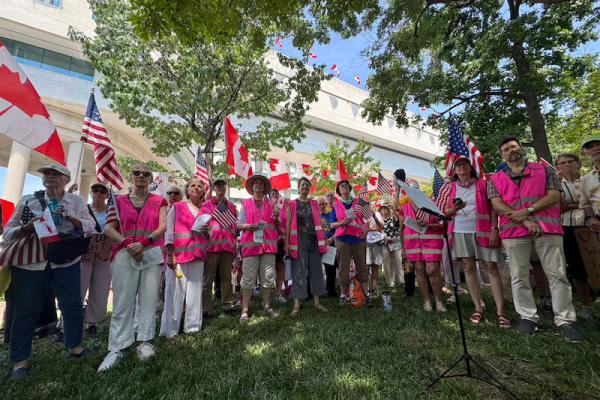A recent poll found that a staggering 78 percent of Americans are now in favor of a federal job guarantee. Although it has been largely erased from public memory, the job guarantee was a centerpiece not only of FDR’s second bill of economic rights, but also of the civil rights movement’s policy agenda. Coretta Scott King mobilized 1.2 million people to march for full employment in the late 1970s. This culminated in the disappointing passage of the watered-down Humphrey-Hawkins Full Employment Act in 1978, a bill that initially included a job guarantee. It is time that we complete the unfinished work of the civil rights movement, and the faith community must be at the forefront of this noble and historic work.
The key point to observe about our current economic arrangement is that it is explicitly designed to fall short of achieving full employment. Much like a game of musical chairs in which someone is left out by design, our system engineers an economic environment in which millions find themselves unemployed and underemployed. Our policymakers actively and intentionally enforce an economy of mass unemployment, which happens to disproportionately claim black and brown casualties.
In practice, what this looks like is when the private sector comes “too close” to achieving full employment (something it has never actually delivered), the Federal Reserve has historically taken steps, namely raising interest rates, to increase unemployment, in the name of protecting the economy from rising inflation. Today, even in a period of historically low unemployment, we still have 11 million Americans unemployed or underemployed. That’s 11 million Americans without proper “seats” in this game of musical chairs our policymakers have us playing. Nothing pushes one into a life of crime more forcefully than the inability to provide for one’s self and one’s family. In the context of mass incarceration, our mass unemployment regime pushes the unemployed into the waiting arms of the for-profit prison industry.
During the Clinton-era welfare reform bill, with the prospect of a job guarantee forgotten, a bipartisan consensus would weaponize the biblical ethic of reciprocity to justify cuts to benefits for those left without a seat in our national game of musical chairs. “He who does not work, neither shall he eat,” we were told. How many of those who found it morally acceptable to withhold bread from those who refuse to contribute to society, realized that the reforms would, in fact, deny bread to those whose contribution society refuses? A great legacy of the civil rights movement is the understanding that society need not refuse the contribution of anyone. The job guarantee is a practical affirmation of the value of the contribution of each member of society. By accepting and facilitating the contribution of every person willing and able to work, the job guarantee adds to society’s abundance for the benefit of all.
Those who have called attention to the need to dismantle our system of mass incarceration are correct to do so. However, to truly rectify the situation, we must provide the unemployed with a legal means of making a living. Our current economic arrangement uses interest rate policy to influence hiring by the private sector, and shuns direct hiring by the public sector as a means of delivering full employment. The private sector, meanwhile, is composed of for-profit businesses that bear no official responsibility for delivering full employment. In fairness to the private sector, only an institution that is not bound by the constraints of profitability can be charged with the responsibility of providing employment to all who seek it. This is why delivering full employment through a job guarantee is a proper role of government. The great advantage that efforts to pass a job guarantee have today, which previous generations did not, is a robust theoretical defense of the proposition that a job guarantee would neither cause excessive inflation nor require tax increases.
We are living in a time in which the foundational justifications for choosing mass incarceration over full employment have collapsed, but we still have yet to reverse our choice. However, after decades in the political wilderness, the job guarantee is once again within reach, as a key pillar of the Green New Deal. Hundreds of individuals and organizations have signed on to the Jobs for All Manifesto, including the Black Church Center for Justice and Equality, and the youth-led Sunrise Movement, which is at the forefront of the push for a Green New Deal. We urge the faith community to pick up the torch handed down by the civil rights movement and help provide much needed moral leadership by standing with the growing chorus of organizations and individuals once again calling for a job guarantee.
Got something to say about what you're reading? We value your feedback!






